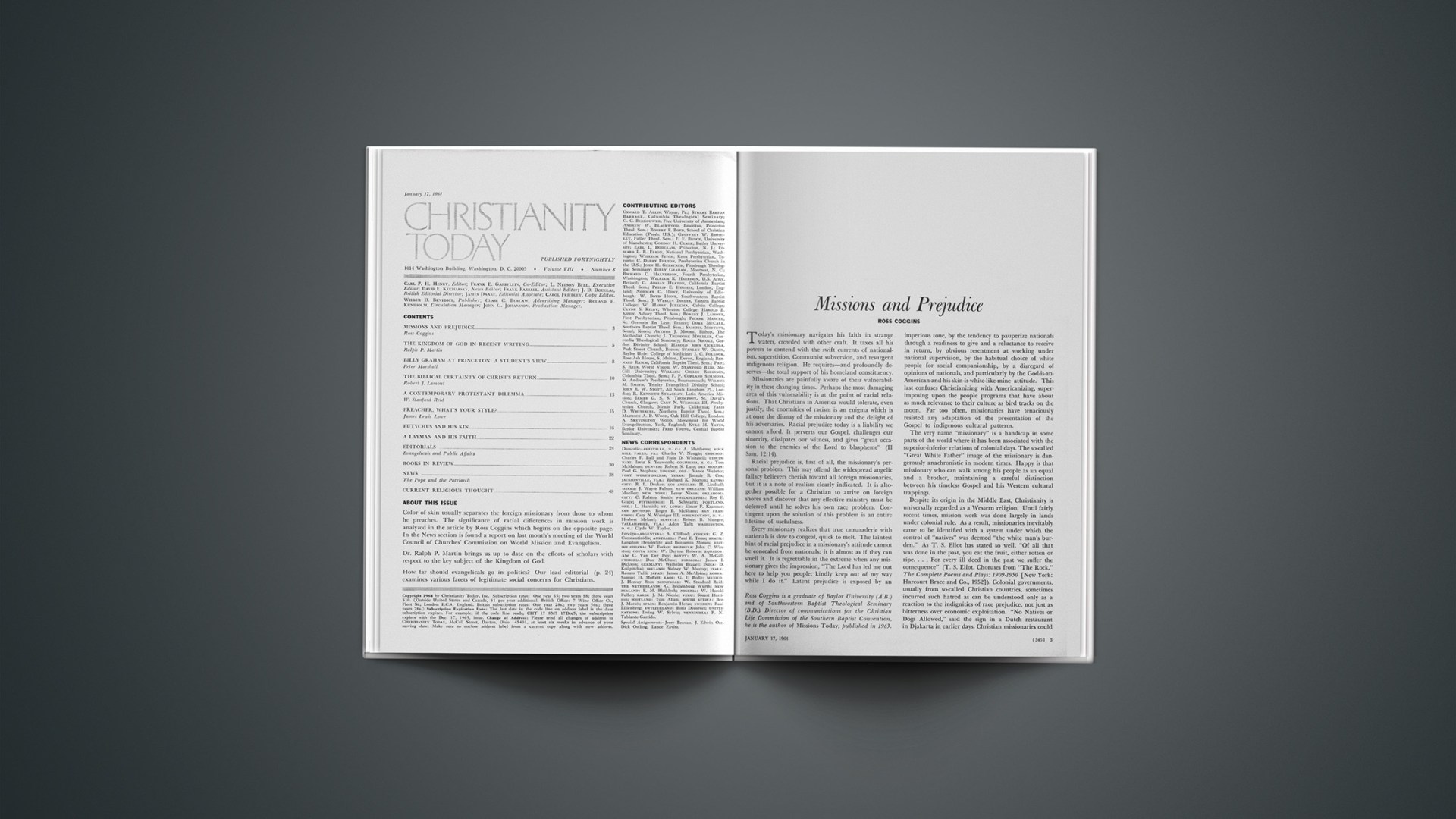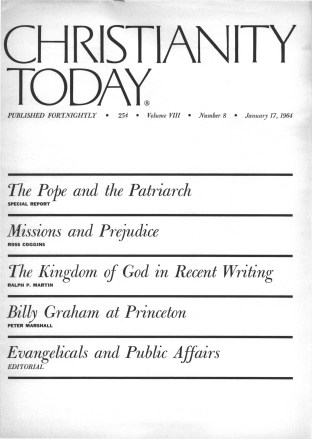Today’s missionary navigates his faith in strange waters, crowded with other craft. It taxes all his powers to contend with the swift currents of nationalism, superstition, Communist subversion, and resurgent indigenous religion. He requires—and profoundly deserves—the total support of his homeland constituency.
Missionaries are painfully aware of their vulnerability in these changing times. Perhaps the most damaging area of this vulnerability is at the point of racial relations. That Christians in America would tolerate, even justify, the enormities of racism is an enigma which is at once the dismay of the missionary and the delight of his adversaries. Racial prejudice today is a liability we cannot afford. It perverts our Gospel, challenges our sincerity, dissipates our witness, and gives “great occasion to the enemies of the Lord to blaspheme” (2 Sam. 12:14).
Racial prejudice is, first of all, the missionary’s personal problem. This may offend the widespread angelic fallacy believers cherish toward all foreign missionaries, but it is a note of realism clearly indicated. It is altogether possible for a Christian to arrive on foreign shores and discover that any effective ministry must be deferred until he solves his own race problem. Contingent upon the solution of this problem is an entire lifetime of usefulness.
Every missionary realizes that true camaraderie with nationals is slow to congeal, quick to melt. The faintest hint of racial prejudice in a missionary’s attitude cannot be concealed from nationals; it is almost as if they can smell it. It is regrettable in the extreme when any missionary gives the impression, “The Lord has led me out here to help you people; kindly keep out of my way while I do it.” Latent prejudice is exposed by an imperious tone, by the tendency to pauperize nationals through a readiness to give and a reluctance to receive in return, by obvious resentment at working under national supervision, by the habitual choice of white people for social companionship, by a disregard of opinions of nationals, and particularly by the God-is-an-American-and-his-skin-is-white-like-mine attitude. This last confuses Christianizing with Americanizing, superimposing upon the people programs that have about as much relevance to their culture as bird tracks on the moon. Far too often, missionaries have tenaciously resisted any adaptation of the presentation of the Gospel to indigenous cultural patterns.
The very name “missionary” is a handicap in some parts of the world where it has been associated with the superior-inferior relations of colonial days. The so-called “Great White Father” image of the missionary is dangerously anachronistic in modern times. Happy is that missionary who can walk among his people as an equal and a brother, maintaining a careful distinction between his timeless Gospel and his Western cultural trappings.
Despite its origin in the Middle East, Christianity is universally regarded as a Western religion. Until fairly recent times, mission work was done largely in lands under colonial rule. As a result, missionaries inevitably came to be identified with a system under which the control of “natives” was deemed “the white man’s burden.” As T. S. Eliot has stated so well, “Of all that was done in the past, you eat the fruit, either rotten or ripe.… For every ill deed in the past we suffer the consequence” (T. S. Eliot, Choruses from “The Rock,” The Complete Poems and Plays: 1909–1950 [New York: Harcourt Brace and Co., 1952]). Colonial governments, usually from so-called Christian countries, sometimes incurred such hatred as can be understood only as a reaction to the indignities of race prejudice, not just as bitterness over economic exploitation. “No Natives or Dogs Allowed,” said the sign in a Dutch restaurant in Djakarta in earlier days. Christian missionaries could not avoid being associated with the general aura of white paternalism and superiority. This explains why some national leaders consider Christian missions as vestigial colonialism, an intolerable reminder of the past.
Since World War II a universal declaration of independence has taken place that has seen nearly fifty new nations emerge. These young nations are often unable to cope with their problems because the colonial governments did not consider them worthy of educational preparation (with notable exceptions). For instance, when thirteen million Congolese were freed by the Belgians, there were only sixteen college graduates among them. In 1940, Indonesia had only 157 students in colleges and universities, out of a population of over seventy million.
Is it difficult to understand the distrust of these people toward all white men, the missionaries included? “Christianity is the religion of the white man,” said a Muslim leader in Indonesia. “Shun it.”
Soon after arriving in Indonesia we noticed our household helpers customarily knelt when they served us refreshments. It seemed a degrading and unnecessary thing, and we discontinued it against the advice of our Dutch neighbor. “They enjoy it,” he confided. On one occasion this same neighbor overheard me address the Indonesian postman as Tuan, the Indonesian equivalent of “Mister.” “You simply must not treat these people as equals,” he insisted. We felt, however, that the Christian thing to do was always to Tuan to others as we would have them Tuan to us. If that is poor humor, it is good religion. It is only through dissociating himself from the embarrassing heritage of colonialism that the modern missionary can gain an entrance into the hearts of people.
Preachment Vs. Practice
One of the most appalling stigmata of our time is the great gulf fixed between our Gospel and our conduct in the eyes of the world. Early missionaries could observe a discreet silence about racial prejudice in their homelands, but this is impossible in today’s world. We cannot hide the abysmal disparity between our preachment and our practice.
In times of swift communication,
Nation cannot hide from nation
What it does. Within brief hours
Headlines shout how hatred’s powers
Close love’s doors with jarring thud
Because of race, because of blood.
Racial tension in your home town exerts a seismic effect on world missions. Our missionaries around the world describe our racial discrimination as a veritable millstone around the neck of Christian missions.
Consider some questions your missionaries are compelled to answer every day. Why are churches in America segregated? How can Christianity and racial discrimination be reconciled? Why am I refused admittance into a Baptist school in America when I am welcome in a Russian university? How can you explain German bestiality during the war in the light of their Christian heritage? And perhaps the worst question of all: Why do you believe Christianity will do so much more for my country than it has for yours?
There are some answers to questions like these, but they sound very hollow half-a-world away from home. The fact is, we have unfortunately permitted our race failures to neutralize the effectiveness of our missionaries. They are at the forefront of our struggle against the powers of evil, and we have weakened their hands. On mission fields this struggle has Darwinian overtones, for only the fittest can survive. Will we continue to supply weapons for the enemy’s hands?
An East-West Encounter
On the day after the Russians orbited their first astronaut, I happened to be in the airlines office in Bandung. Standing just behind me at the counter was a tall Russian who was in Bandung to attend an Asia-Africa conference of some kind. The lobby was crowded with delegates from the various countries, each of whom embraced the Russian and congratulated him upon the splendid achievement in outer space. I was frankly jealous for my own country.
The Russian and I fell into a lengthy conversation which was frequently interrupted by these jovial salutations from passing delegates. I, too, congratulated the Russian and then asked him about the conference. “The most satisfying reports,” he said, “have come from the new nations in Africa. These people at last are throwing off the shackles of colonialism and imperialism.”
I replied that my own country warmly approved every step forward these people were taking, and I expressed disappointment that an American voice could not declare this to the conference.
“They would not listen,” declared the Russian. “They would feel you had no right to speak.”
I knew what he was getting at, but I had a morbid desire to hear him say it. I asked him to explain.
He replied with ill-concealed satisfaction, “Many of these African delegates have been to your country. They have met your Mr. Jim Crow—I believe that is his name.” Then he tapped me on the chest with his forefinger and concluded, “This Jim Crow is your delegate to our conference. He is your number one ambassador to these people.”
In a day when Marxists are calling every man comrade, let us not refuse to call any man brother.
It is difficult to say anything on the race problem that is not repetitious or platitudinous. Our dilemma stems not from lack of words, however, but from lack of action. It is astounding how often and how well this issue is addressed. The time has come for Christian action to turn the oughts to shalls.
There is no denying that our continued toleration of an oppressive status quo stems from a timorous disinclination to translate into action the New Testament revelation of God’s love.
What does it mean that all men are equally the objects of God’s love? It means that all the ways we separate or humiliate others are an offense to God. It means that every child has the right to grow up with a sense of dignity and worth. It means that no man must live out his days indentured to “his place.” It means that all our strategems of evasion are intolerable to God.
More specifically, the love of God means that we should treat every man as a human being. We should throw open our hospital doors to any man seeking healing. We should open our educational institutions to any man seeking knowledge. There should be no racially imposed barriers to equal citizenship, employment opportunity, or access to public recreation facilities. Above all, let every church abide by the sign placed in front of so many churches: Everybody Welcome. Paul expressed this concept with eloquent simplicity when he wrote to Philemon concerning the runaway slave, Onesimus: “Receive him … as … a brother.”
I am not suggesting that we should lightly cast aside our national traditions; I am suggesting that we throw them aside with great force wherever they violate the spirit and teaching of the New Testament. We must obey God rather than men.
What profound dichotomy has enabled many Christians to believe in world missions abroad and racial discrimination at home? Many of our failures obviously stem from a lack of information about the relation of racism to missionary outreach. Racial prejudice and foreign missions are mutually exclusive, for missions simply means sharing the Gospel with all races; it is the Gospel in world perspective.
Missionaries believe they have a right to expect this note to be sounded with courage from pulpits here in America. Needless to say, they are often bitterly disappointed. Their courage in going to the ends of the earth is often unmatched by Christian leaders at home who blandly ignore the existence of a problem. In the chaotic world of today, can the bland lead the bland?
Ross Coggins is a graduate of Baylor University (A.B.) and of Southwestern Baptist Theological Seminary (B.D.). Director of communications for the Christian Life Commission of the Southern Baptist Convention, he is the author of Missions Today, published in 1963.










